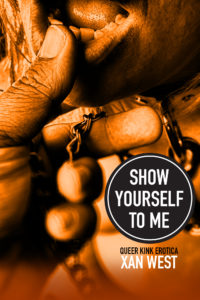They both fell for Essex Hemphill. That’s how it started.
It was with those opening lines of the story of “Falling for Essex,” that I fell

“Essex Hemphill” by Source (WP:NFCC#4). Licensed under Fair use via Wikipedia – https://en.wikipedia.org/wiki/File:Essex_Hemphill.jpg#/media/File:Essex_Hemphill.jpg
hard for author Xan West’s Show Yourself to Me. Essex Hemphill, pictured to the right, a fellow Washingtonian who passed at the age of 38 in 1995 due to complications from AIDS-related illnesses, was an inspiring poet and activist who, while held in high regard by some, has sadly been forgotten by many others.
In “Falling for Essex” — one of the short stories in the book — characters Leroy and Samuel are attending UC Santa Cruz and are two of only five black1 students in their Queer Black Film seminar. When they both sign up to present on Isaac Julien’s Looking for Langston (short clip of film, NSFW) and Marlon Riggs‘ Tongues Untied (full film, NSFW) — a shared element of these two short films being Essex Hemphill and his poetry — the relationship between the two students becomes erotic, all the while remaining cognizant of many of the issues embedded within erotic play.
Often when we play, we disregard the many layers and intricacies of what it means and has historically meant for ourselves and for others (big emphasis on others here, please) to be dominant or submissive not by choice or for pleasure, to give or receive pain not by choice or for pleasure, to give or receive humiliation and degradation not by choice or for pleasure, and to be available to the will of another or others without consent. Many of us simply don’t want to think about these things, to go there with those conversations, because, well, they aren’t sexy. They’re complicated. They hurt, and not in a fun, yes please, sort of way.
In “Falling for Essex,” Xan West’s character Leroy quotes Essex Hemphill’s poem “Where Seed Falls” from Looking for Langston, and says, “We are the hunger of shadows.” From the same poem, with apologies to Hemphill for out of context use, “The neighborhood is dangerous / but [West goes] there.” West’s characters in “Falling for Essex” are unapologetic in their need to “go there” and to begin to discuss the complicated situations they have experienced within their power play dynamics stemming from racial disparities.
Leroy, the dominant character, begins by taking a stance on vernacular used within the D/s lifestyle that has been used as a racial term of degradation.
Leroy paused and pushed himself to say it. “I won’t call you ‘boy.’ That cool by you?”
Samuel’s face fell, and he held his breath for a minute before he spoke. “Can you tell me more about that?” he asked, worried.
“I just…it’s too damn loaded, you know?”
Hey, look at that! Something really heavy and loaded was addressed and I promise you that within five minutes, sexytimes were still had! It can be done. But wait, there was more! Leroy queried Samuel about his experience and received a thought-provoking answer.
“Have you taken pain before?”
“Some. White folks always wanted to tie me up or use whips.” He sucked his teeth. “That wasn’t going to happen.”
Leroy nodded, so he continued. “They were all surprised. Like they thought it was no big deal. What the fuck?”
Leroy reached for his hand and just held it, meeting his eyes.
“Fuck them.”
 Samuel’s answer was thought-provoking, but Leroy chose not to dwell on it at that time. This is erotica, after all. But I would argue that this could also be real life. Two people with a similar understanding of the world — one shares a painful truth, the other listens and acknowledges the pain, the speaker feels acknowledged, then sexytimes can be had for all! (“Every time we kiss / we confirm the new world coming2.”) Each mention of a painful truth need not be a discussion of multiple hours. Decolonizing love3, decolonizing relations, decolonizing kink — it’s all going to be a process of many steps. Some will be long, some will be short; some will be difficult, some will be relatively easy; all are important. (“They don’t know / we are becoming powerful4.”)
Samuel’s answer was thought-provoking, but Leroy chose not to dwell on it at that time. This is erotica, after all. But I would argue that this could also be real life. Two people with a similar understanding of the world — one shares a painful truth, the other listens and acknowledges the pain, the speaker feels acknowledged, then sexytimes can be had for all! (“Every time we kiss / we confirm the new world coming2.”) Each mention of a painful truth need not be a discussion of multiple hours. Decolonizing love3, decolonizing relations, decolonizing kink — it’s all going to be a process of many steps. Some will be long, some will be short; some will be difficult, some will be relatively easy; all are important. (“They don’t know / we are becoming powerful4.”)
With all that being said, I dearly hope that this is just the beginning of West’s exploration of writing about decolonizing kink. It’s a topic that has very little written about it, particularly in published material and especially in fiction. More please, and thank you! I think Essex Hemphill would agree.
1. In this instance, author Xan West uses Black in the lower case.
2. Excerpt from poem “American Wedding” by Essex Hemphill.
3. Recognizing that decolonizing love, relations, and kink, is similar to the idea of “decolonial love,” proposed by Junot Díaz in November 2012 as the keynote speaker for the Facing Race conference in Baltimore.
4. Excerpt from poem “American Wedding” by Essex Hemphill.
Purchase the eBook or print copy of Show Yourself to Me at Go Deeper Press, Amazon.com, or Barnes and Noble.
Author Xan West is the nom de plume of Corey Alexander, a recent transplant to Oakland from Brooklyn, who has been doing community kink education for over ten years. Xan has been published in over 35 erotica anthologies, including the Best S/M Erotica series, the Best Gay Erotica series, and the Best Lesbian Erotica series. Xan’s story “First Time Since,” won honorable mention for the 2008 National Leather Association John Preston Short Fiction Award. Xan’s work has been described by reviewers as “offering the erotica equivalent of happy ever after” and as “some of the best transgressive erotic fiction to come along in recent years.”
Xan refuses pronouns, twists barbed wire together with yearning, and tilts pain in many directions to catch the light. Xan adores vulnerable tops; strong, supportive bottoms; red meat; long winding conversations about power, privilege, and community; showtunes; and cool, dark, quiet rooms with comfortable beds. Find Xan’s thoughts about the praxis of sex, kink, queerness, power, and writing at xanwest.wordpress.com.
The full schedule of stops on the book release blog tour are:
- October 1: Xan West https://xanwest.wordpress.com/
- October 2: Book Birthday! Go Deeper Press http://godeeperpress.com/
- October 3: Heather Elizabeth https://kinkopedia.wordpress.com/
- October 4: Sinclair Sexsmith http://www.sugarbutch.net/
- October 5: Hermia Swann http://www.cuntext.com/
- October 6: Dilo Keith https://dilokeith.wordpress.com/ and Cecilia Tan http://blog.ceciliatan.com/
- October 7: Kinky Brits http://thekinkybrits.com/
- October 8: Stella Harris http://stellaharris.net/
- October 9: F. Leonora Solomon https://fdotleonora.wordpress.com/
- October 10: Tasha Harrison http://tashalharrison.com/
- October 11: Benji Bright http://www.theeroticledger.com/
- October 12: Tamsin Flowers http://tamsinflowers.com/ and Karida http://submissionandthecity.com/
- October 13: Cassandra Perry https://connectwithcaz.com/
- October 14: Peep Scoop http://www.peepscoop.com/ and Radical Access Mapping Project https://radicalaccessiblecommunities.wordpress.com/
- October 15: Sugar Cunt http://www.sugarcuntwrites.com/
- October 16: Emily Byrne http://writeremilylbyrne.blogspot.com/
- October 17: Oleander Plume http://poisonpendirtymind.com/
- October 18: K. A. Smith https://authorka.wordpress.com/
- October 19: Giselle Renarde http://donutsdesires.blogspot.com/
- October 20: Butchtastic Kyle http://www.butchtastic.net/
- October 21: Lisabet Sarai http://lisabetsarai.blogspot.com/
- October 22: Syrens https://syrens.wordpress.com/
- October 23: Anna Sky http://www.iamannasky.com/
- October 24: Jade A. Waters http://jadeawaters.com/
- October 25: Ashley Young https://indigostheory.
wordpress.com/ - October 26: Rebekah Weatherspoon http://www.rebekahweatherspoon.com/
- October 27: Malin James http://malinjames.com/
- October 28: BD Swain http://www.bdswain.com/ and Jillian Boyd http://jillianboydauthor.wordpress.com/
- October 29: Kaleigh Trace http://thefuckingfacts.com/
- October 30: Kiki DeLovely https://kikidelovely.wordpress.com/
- October 31: Xan West https://xanwest.wordpress.com/ and Annabeth Leong http://annabetherotica.com/

